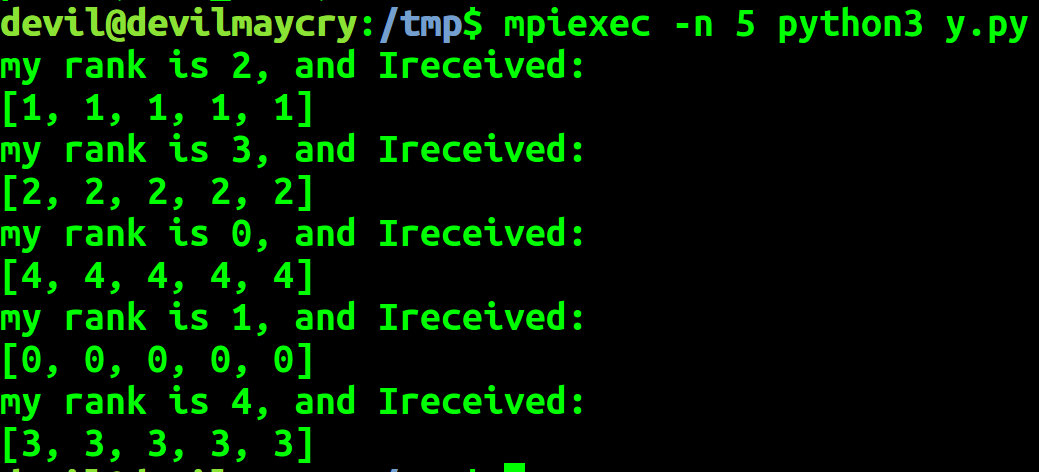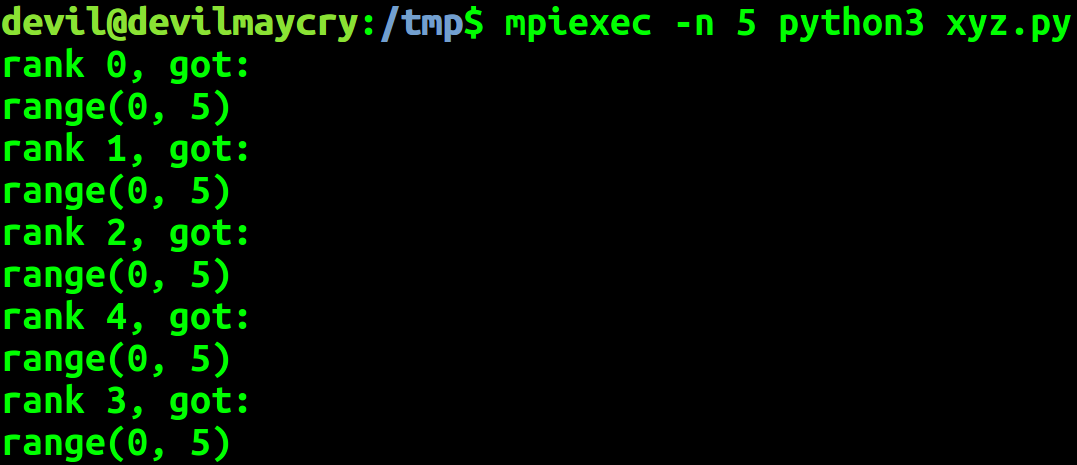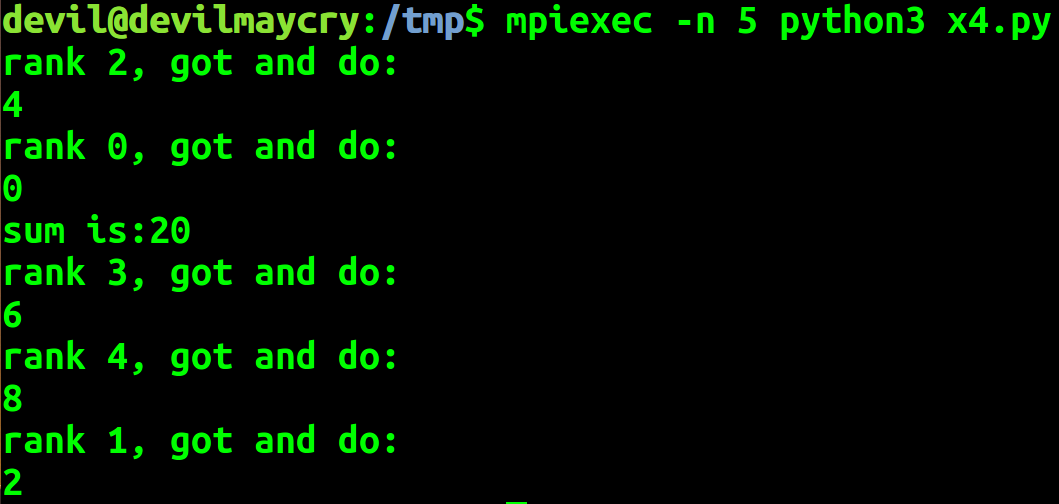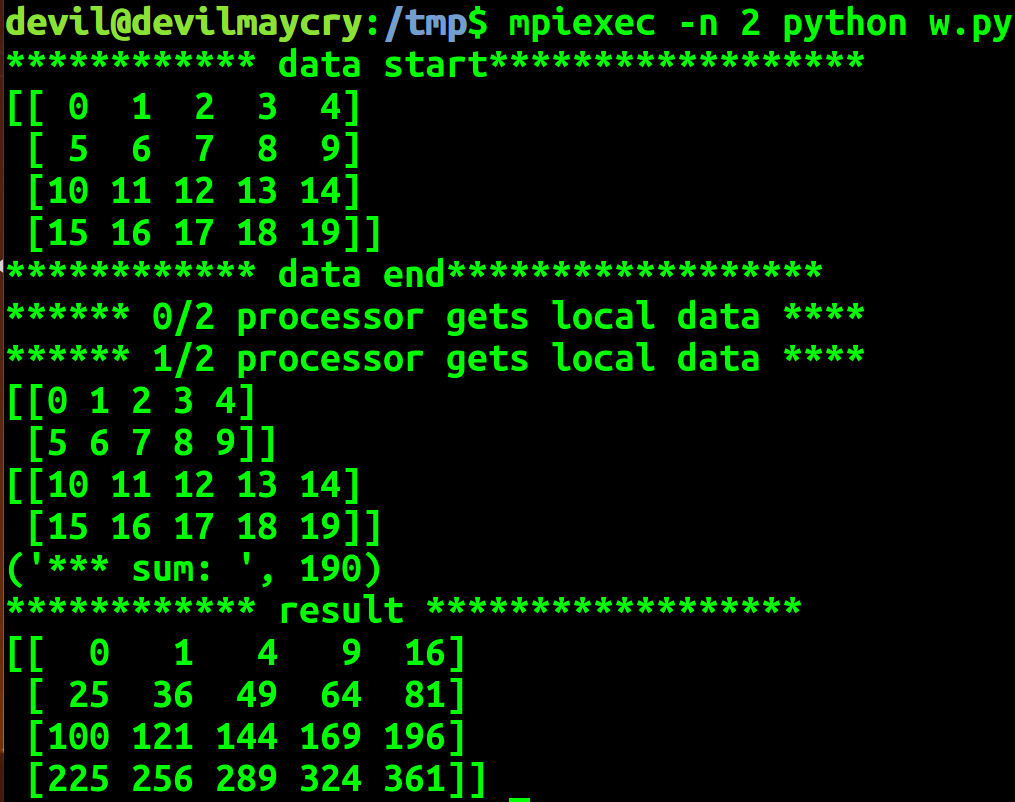MPI 和 MPI4PY 的搭建上一篇文章已经介绍,这里面介绍一些基本用法。
mpi4py 的 helloworld
from mpi4py import MPI print("hello world")
mpiexec -n 5 python3 x.py

2. 点对点通信
因为 mpi4py 中点对点的 通信 send 语句 在数据量较小的时候是把发送数据拷贝到缓存区,是非堵塞的操作, 然而在数据量较大时候是堵塞操作,由此如下:
在 发送较小数据时:
import mpi4py.MPI as MPI comm = MPI.COMM_WORLD comm_rank = comm.Get_rank() comm_size = comm.Get_size() # point to point communication data_send = [comm_rank]*5 comm.send(data_send,dest=(comm_rank+1)%comm_size) data_recv =comm.recv(source=(comm_rank-1)%comm_size) print("my rank is %d, and Ireceived:" % comm_rank) print(data_recv)

在数据量较大时, 比如发送 :
# point to point communication data_send = [comm_rank]*1000000
这时候就会造成各个进程之间的死锁。(因为这时候各个进程是堵塞执行,每个进程都在等待另一个进程的发送数据)
修改后的代码,所有进程顺序执行, 0进程发送给1,1接收然后发送给2,以此类推:
import mpi4py.MPI as MPI comm = MPI.COMM_WORLD comm_rank = comm.Get_rank() comm_size = comm.Get_size() data_send = [comm_rank]*1000000 if comm_rank == 0: comm.send(data_send, dest=(comm_rank+1)%comm_size) if comm_rank > 0: data_recv = comm.recv(source=(comm_rank-1)%comm_size) comm.send(data_send, dest=(comm_rank+1)%comm_size) if comm_rank == 0: data_recv = comm.recv(source=(comm_rank-1)%comm_size) print("my rank is %d, and Ireceived:" % comm_rank) print(data_recv)
3 群体通信
3.1 广播bcast
一个进程把数据发送给所有进程
import mpi4py.MPI as MPI comm = MPI.COMM_WORLD comm_rank = comm.Get_rank() comm_size = comm.Get_size() if comm_rank == 0: data = range(comm_size) dat = comm.bcast(data if comm_rank == 0 else None, root=0) print('rank %d, got:' % (comm_rank)) print(dat)

发送方 也会收到 这部分数据,当然发送方这份数据并不是网络传输接受的,而是本身内存空间中就是存在的。
3.2 散播scatter
import mpi4py.MPI as MPI comm = MPI.COMM_WORLD comm_rank = comm.Get_rank() comm_size = comm.Get_size() if comm_rank == 0: data = range(comm_size) else: data = None local_data = comm.scatter(data, root=0) print('rank %d, got:' % comm_rank) print(local_data)

3.3 收集gather
将所有数据搜集回来
import mpi4py.MPI as MPI comm = MPI.COMM_WORLD comm_rank = comm.Get_rank() comm_size = comm.Get_size() if comm_rank == 0: data = range(comm_size) else: data = None local_data = comm.scatter(data, root=0) local_data = local_data * 2 print('rank %d, got and do:' % comm_rank) print(local_data) combine_data = comm.gather(local_data,root=0) if comm_rank == 0: print("root recv {0}".format(combine_data))

3.4 规约reduce
import mpi4py.MPI as MPI comm = MPI.COMM_WORLD comm_rank = comm.Get_rank() comm_size = comm.Get_size() if comm_rank == 0: data = range(comm_size) else: data = None local_data = comm.scatter(data, root=0) local_data = local_data * 2 print('rank %d, got and do:' % comm_rank) print(local_data) all_sum = comm.reduce(local_data, root=0,op=MPI.SUM) if comm_rank == 0: print('sum is:%d' % all_sum)
SUM MAX MIN 等操作在数据搜集是在各个进程中进行一次操作后汇总到 root 进程中再进行一次总的操作。
op=MPI.SUM
op=MPI.MAX
op=MPI.MIN

3.5 对一个文件的多个行并行处理
#!usr/bin/env python #-*- coding: utf-8 -*- import sys import os import mpi4py.MPI as MPI import numpy as np # Global variables for MPI # instance for invoking MPI relatedfunctions comm = MPI.COMM_WORLD # the node rank in the whole community comm_rank = comm.Get_rank() # the size of the whole community, i.e.,the total number of working nodes in the MPI cluster comm_size = comm.Get_size() if __name__ == '__main__': if comm_rank == 0: sys.stderr.write("processor root starts reading data... ") all_lines = sys.stdin.readlines() all_lines = comm.bcast(all_lines if comm_rank == 0 else None, root = 0) num_lines = len(all_lines) local_lines_offset = np.linspace(0, num_lines, comm_size +1).astype('int') local_lines = all_lines[local_lines_offset[comm_rank] :local_lines_offset[comm_rank + 1]] sys.stderr.write("%d/%d processor gets %d/%d data " %(comm_rank, comm_size, len(local_lines), num_lines)) for line in local_lines: output = line.strip() + ' : process every line here' print(output)

3.6 对多个文件并行处理
#!usr/bin/env python #-*- coding: utf-8 -*- import sys import os import mpi4py.MPI as MPI import numpy as np # Global variables for MPI # instance for invoking MPI relatedfunctions comm = MPI.COMM_WORLD # the node rank in the whole community comm_rank = comm.Get_rank() # the size of the whole community, i.e.,the total number of working nodes in the MPI cluster comm_size = comm.Get_size() if __name__ == '__main__': if len(sys.argv) != 2: sys.stderr.write("Usage: python *.py directoty_with_files ") sys.exit(1) path = sys.argv[1] if comm_rank == 0: file_list = os.listdir(path) sys.stderr.write("......%d files...... " % len(file_list)) file_list = comm.bcast(file_list if comm_rank == 0 else None, root = 0) num_files = len(file_list) local_files_offset = np.linspace(0, num_files, comm_size +1).astype('int') local_files = file_list[local_files_offset[comm_rank] :local_files_offset[comm_rank + 1]] sys.stderr.write("%d/%d processor gets %d/%d data " %(comm_rank, comm_size, len(local_files), num_files)) sys.stderr.write("processor %d has %s files "%(comm_rank, local_files))

3.7 联合numpy对矩阵的多个行或者多列并行处理
import os, sys, time import numpy as np import mpi4py.MPI as MPI # instance for invoking MPI relatedfunctions comm = MPI.COMM_WORLD # the node rank in the whole community comm_rank = comm.Get_rank() # the size of the whole community, i.e.,the total number of working nodes in the MPI cluster comm_size = comm.Get_size() # test MPI if __name__ == "__main__": #create a matrix if comm_rank == 0: all_data = np.arange(20).reshape(4, 5) print("************ data start******************") print(all_data) print("************ data end******************") #broadcast the data to all processors all_data = comm.bcast(all_data if comm_rank == 0 else None, root = 0) #divide the data to each processor num_samples = all_data.shape[0] local_data_offset = np.linspace(0, num_samples, comm_size + 1).astype('int') #get the local data which will be processed in this processor local_data = all_data[local_data_offset[comm_rank] :local_data_offset[comm_rank + 1]] print("****** %d/%d processor gets local data ****" %(comm_rank, comm_size)) print(local_data) #reduce to get sum of elements local_sum = local_data.sum() all_sum = comm.reduce(local_sum, root = 0, op = MPI.SUM) #process in local local_result = local_data ** 2 #gather the result from all processors and broadcast it result = comm.allgather(local_result) result = np.vstack(result) if comm_rank == 0: print("*** sum: ", all_sum) print("************ result ******************") print(result)

参考文章:
《Python多核编程mpi4py实践》